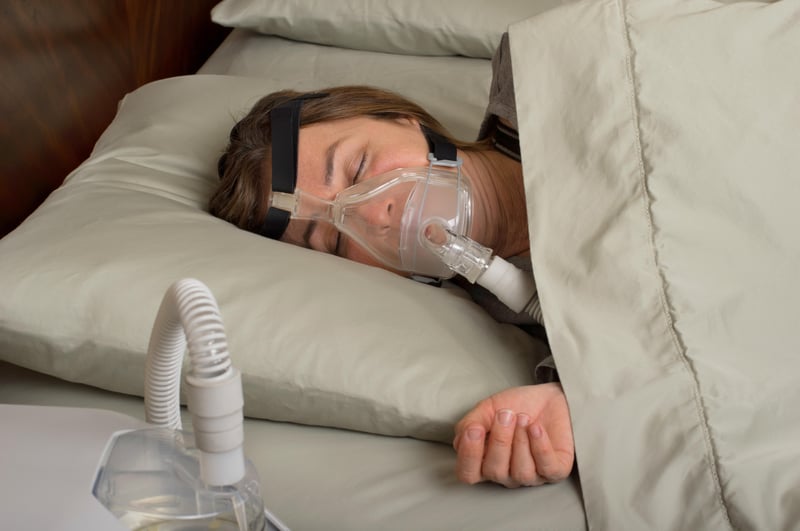Manténgase sano!

- Posted April 20, 2022
Is a Drug for Sleep Apnea on the Horizon?
The most common treatments for sleep apnea are mechanical -- CPAP machines, mouthguards and the like.
But researchers think they've found a drug that might ease sleep apnea in some.
The drug sulthiame, normally used to treat epilepsy, appeared to reduce breathing pauses by more than 20 events an hour, on average, in obstructive sleep apnea patients, according to early clinical trial results.
Those results are some of the strongest ever reported in a drug trial for sleep apnea, researchers said.
"For just over a third of patients in the study, only half of their breathing pauses were left, and in 1 in 5 the number fell by at least 60%," said lead researcher Dr. Jan Hedner, a professor of pulmonary medicine at the University of Gothenburg in Sweden.
Sulthiame inhibits an enzyme that serves to maintain the balance of carbon dioxide in the body.
Some people suffer from what doctors call a "high loop gain," an elevated sensitivity to blood levels of oxygen and carbon dioxide, said Dr. Kannan Ramar, a sleep medicine expert with the Mayo Clinic in Rochester, Minn.
High loop gain is believed to contribute to sleep apnea in about a third of patients with obstructive sleep apnea, Ramar said.
These patients are more apt to experience a pause in breathing while asleep due to changes in their oxygen or carbon dioxide levels.
"High loop gain makes the system very unstable," Ramar said. "The medication blunts that response. It makes the system more stable, so it doesn't respond as dramatically to changes in carbon dioxide or oxygen levels. The breathing pauses then subsequently stop."
In the United States, the Sleep Foundation estimates that between 2% and 9% of adults have obstructive sleep apnea. The sleep disorder contributes to daytime drowsiness and to heart disease, high blood pressure and stroke.
This early clinical trial was designed to test mainly for safety, and involved about 60 people with moderate or severe sleep apnea. Patients were randomly assigned to one of three groups -- one receiving a high dose of the drug, another receiving a lower dose, and a third receiving a placebo.
After four weeks, researchers found that sulthiame reduced the number of breathing pauses during the night and promoted oxygenation of patients' blood.
Sulthiame also proved relatively safe, with headache and a pins-and-needles sensation on the skin reported as the most common side effects. Some high-dose patients also reported shortness of breath. No severe adverse events occurred, but six patients from the high-dose group dropped out due to their side effects.
"We have decent effects with very few side effects," Hedner said.
Several drugs have been tested over the years as potential treatments for sleep apnea, but none have yet proven useful, said Dr. Jonathan Jun, a sleep medicine expert at Johns Hopkins Hospital in Baltimore.
"I would say, yes, there's a signal that it reduces the frequency of the respiratory events, the episodes of blocked breathing or shallow breathing caused by sleep apnea," Jun said of the sulthiame trial.
But Jun added that the results so far reflect "a partial solution" in which some patients barely responded to the drug while others did well.
"I don't see that this would necessarily be a full solution or complete substitute for a therapy like CPAP [continuous positive airway pressure]," Jun said. A CPAP machine consists of a motor, a hose and a mask fitted over the user's mouth and nose. Air is pushed through the hose to the mask and it keeps the user's airway open during sleep.
The next phase of clinical trials has started for sulthiame, involving about 400 patients from five European countries, Hedner said. Researchers hope to wrap up that phase by late this year or early next.
Sulthiame is one of several drugs now being investigated to treat sleep apnea, Hedner said, and the drugs work in different ways.
"Maybe there will be openings for combinations of drugs, or between mechanical therapies and different types of drugs if we find combinations that work well in patients," Hedner said. "It's a very, very exciting development."
The trial results were published April 15 in the American Journal of Respiratory and Critical Care Medicine.
More information
The Sleep Foundation has more on sleep apnea treatments.
SOURCES: Jan Hedner, MD, PhD, professor, pulmonary medicine, University of Gothenburg, Sweden; Kannan Ramar, MBBS, MD, sleep medicine expert, Mayo Clinic, Rochester, Minn.; Jonathan Jun, MD, sleep medicine expert, Johns Hopkins Hospital, Baltimore; American Journal of Respiratory and Critical Care Medicine, April 15, 2022
